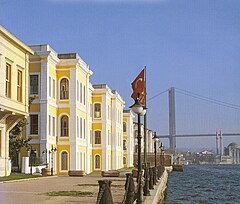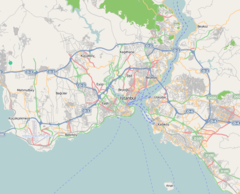Feriye Palace
| Feriye Palace | |
|---|---|

|
|
| General information | |
| Type | Palace |
| Location | Istanbul, Turkey |
| Coordinates | 41°02′44″N 29°01′13″E / 41.04556°N 29.02028°ECoordinates: 41°02′44″N 29°01′13″E / 41.04556°N 29.02028°E |
| Construction started | 1871 |
| Client | Ottoman imperial family |
| Owner | Turkish state |
| Design and construction | |
| Architect | Sarkis Balyan |
The Feriye Palace (Turkish: Feriye Sarayı) is a complex of Ottoman imperial palace buildings along the European shoreline of the Bosphorus strait in Istanbul, Turkey. Currently, the buildings host educational institutions such as a high school and a university.
The palace complex was commissioned by Sultan Abdülaziz (reigned 1861–76) in 1871, and designed by architect Sarkis Balyan. The buildings were built to meet the need of the extended family members of the imperial court for residence. The palace, which was constructed in addition to Dolmabahçe Palace and Çırağan Palace, took the name "Feriye" meaning "secondary" or "auxiliary" in Ottoman Turkish language. It consists of three main buildings on the waterfront, a ward for concubines, a small two-story building and outbuildings on the backside.
On May 30, 1876, Sultan Abdülaziz was deposed by his ministers. He moved to Feriye Palace at his own request after a four-day stay in Topkapı Palace. Shortly after, he was found wrists cut at Feriye Palace. This was documented as a suicide at the time.
Various members of the Ottoman imperial court resided in Feriye Palace until March 3, 1924, the abolition of the Ottoman Caliphate by the parliament of the newly founded Republic of Turkey. The buildings remained vacant for a period of time following the external deportation of the last caliph Abdülmecid II together with the court members.
In 1927, the Maritime College (Turkish: Denizcilik Yüksek Okulu) settled in some buildings of Feriye Palace. In the 1928-29 academic term, Kabataş High School also moved into some buildings of the palace complex. Part of the palace hosted the girls' section of Galatasaray High School when in 1967 the institution started mixed-gender education. Part of the complex in northeastern remained years long neglected.
...
Wikipedia

